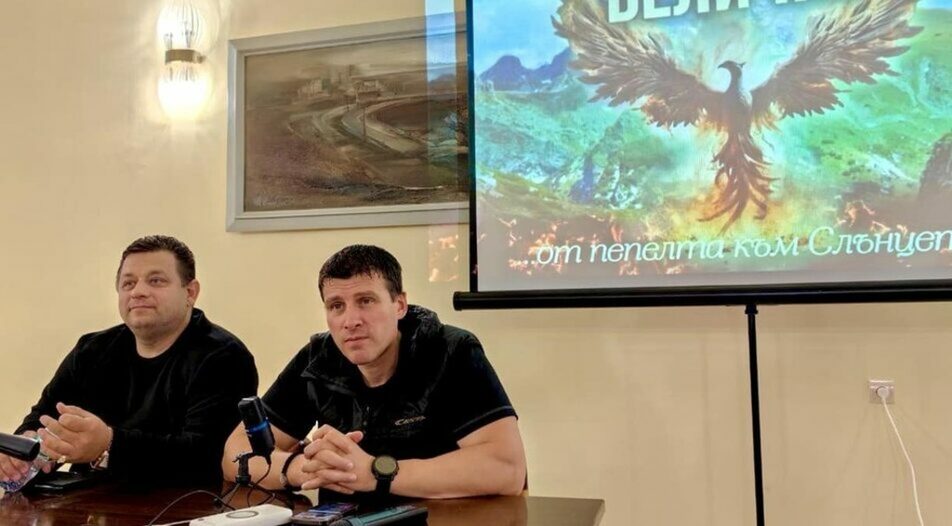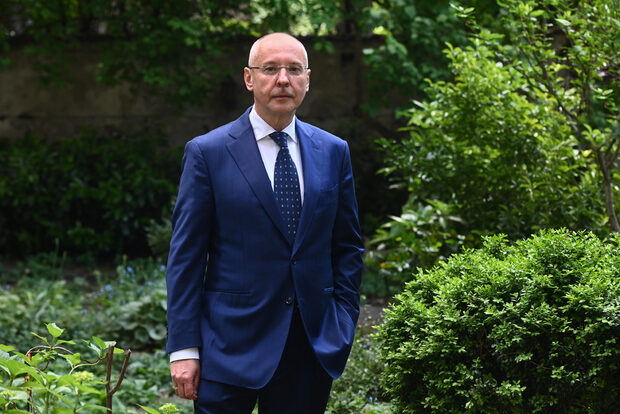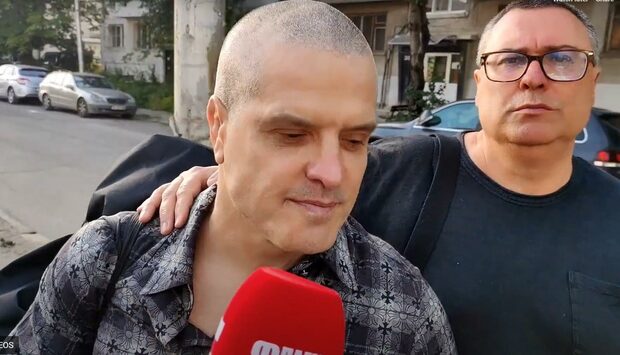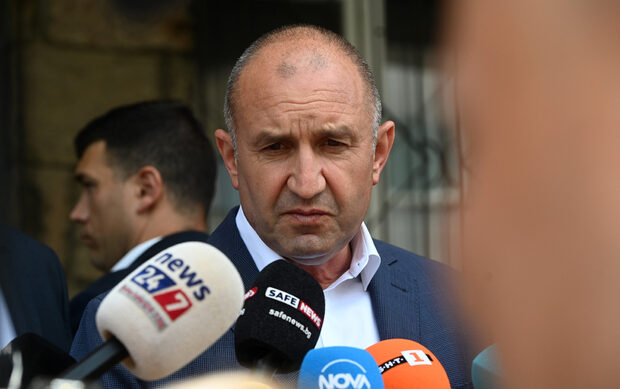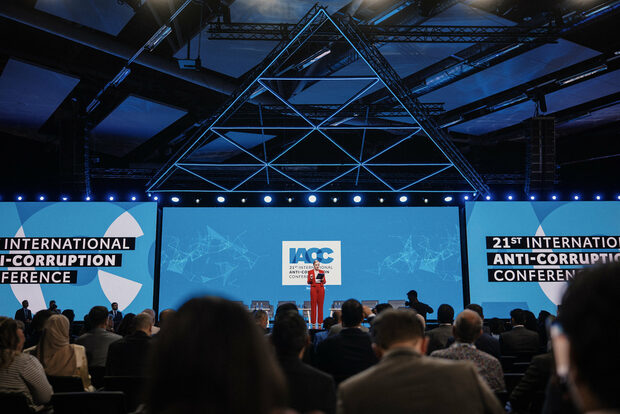It was the post-election night of May 2014. A much younger Delyan Peevski was sweating profusely under the bright lighting of the National Palace of Culture's (NDK) conference room, where traditionally every political party since the fall of communism gave a post-election press briefing. He had been elected for a European Parliament seat and was there to announce he was renouncing it.
This was the first public hearing of Peevski since a full year of protests against his candidacy for chief of the National Security apparatus. He didn't like being there and it showed. "Who was the one who suggested your candidacy?"came a question from bTV. "That's a closed question and I'm not answering it. Good Night!" bawled the arrogant young man in front of the TV cameras before storming out.
Nothing like this can ever happen again.
Little did we know that that night was the last time we'd ever see politicians face the public in an honest and on-air post-election press conference. Was it Peevski, or his partner Borissov, who had decided to kill this new tradition of the democratic Bulgarian state? No one knows for sure, but the fact is, in the subsequent election, the winners GERB declined to be at NDK. They preferred staged press briefings on their own turf, where everything could be controlled, managed, and nothing uncomfortable could ever happen.
Other parties followed suit and just like that, the leading figures of the political scene just stopped answering tough questions. So here we are, a decade later, in an era when a full week after an election nobody bothers to say anything to the voters.
This is, of course, just the tip of the iceberg. In that decade a lot of other things died: press freedom, the means to conduct business without paying a bribe, and the ability to build quality infrastructure. Yet the disappearance of the natural journalistic desire to ask tough questions and hold the powerful to account was the canary in the mine, which suggested something was deeply rotten. TV programs consisted of endless talking heads shouting at each other, where nothing was ever thrashed through and no serious accusations were ever aired.
This led to the rise of youtubers, tik-tokers and others. There is a whole galaxy of online influencers, claiming to be "speaking the truth". Out of this galaxy a new star appeared: the Velichie (or "Greatness" in Bulgarian) party which made it to Parliament (more on that below). When no mainstream politicians get challenged in public, and none of the principal channels address the public honestly, this is what happens. Facebook is not a substitute for journalism.
It will happen more and more. And rightly so. Whatever we had as a political status quo no longer delivers or functions. Less than a third of the voters even bothered voting last Sunday. Seems to me one more thing is about to die - whatever pretense we have to be a functioning democracy.
1. Politics this week:
GERB breaks its silence: gov't with the first mandate - or early electionsTalking about the disconnect between parties and journalists, the winners of the election - GERB - deigned to give a press conference on the fourth day after the election. Boyko Borissov's offer was clear: since his party has convincingly won the election, he (or rather his all-female negotiating team, as he'll probably be busy watching Euro 2024) would reach out to the other parties to form an expert cabinet, but with a PM, Foreign Minister and Defense from GERB. Yes, you heard it right - Borissov himself won't run for PM for the fourth time around, and neither will Mariya Gabriel who "has other business," as GERB's leader put it.
There is a catch, however: the offer is only valid with the first mandate. "How do I explain to my party that we win a third election in a row and don't form a cabinet," Borissov exclaimed, adding that "Bulgarians need a government, our Euro-Atlantic partners need a government."
Peevski awaits his invitation
Borissov's press conference and offer came exactly one day after MRF leader Delyan Peevski called on him to start negotiations on forming a government and vowed to save Bulgaria from Rumen Radev, who wanted to betray the country and deliver it to Putin on a platter. "I call on all responsible political leaders to immediately start consultations to find a formula for forming a stable government. I call on the leader of the largest political force, Mr Boyko Borissov, and the GERB party to start this process as befits them as the first political force in the 50th National Assembly," Peevski was quoted saying by the MRF press service on Facebook.
Shake-up within the reformists and BSP
The number of MPs of the two parties - 68 and 47, respectively, is insufficient to form a majority in Parliament. So someone else would need to back the "expert" cabinet led by a GERB PM. There aren't many options as the former partners from WCC-DB vowed to remain in opposition in the next parliament. Or, to be precise, WCC's Kiril Petkov said so - the parties forming Democratic Bulgaria remain silent, apart from Yes, Bulgaria, whose leader Hristo Ivanov resigned the day after the vote. Still, a split in the reformist camp is highly unlikely right now.
So the other options are TISP (which have changed their mind on GERB so often, and are generally quite big fans of "expert" cabinets, such that it wouldn't surprise anyone if they join one now) and BSP, which is undergoing its own internal convulsions, with leader Kornelia Ninova resigning for the third time over the endlessly disastrous election results. This time around, her resignation could be accepted, as parts of her internal opposition are definitely gearing up to jump on GERB's expert bandwagon before their party finally bites the dust.
Last, but not least, never forget that new and fragile constructs like the populists from Velichie can always split and back Borissov, as many of GERB's opponents have done in the past.
In any case, expect intense bargaining in the coming days. The disastrous voter turnout, and the rising political ambitions (and pro-Russian crescendo) of President Rumen Radev and the uncertainty poised by the upcoming US elections will all pile the pressure on Borissov to finally take the reins once again, even at the risk of making an unpopular move.
Mummy, I and DANS
We often talk about state capture in Bulgaria, but this week we saw a prime example with a corporation hijacking nothing less than the state intelligence agency for its own ends. The story goes like this: the State Agency for National Security (DANS) summoned two members of the Public Council for the construction of the National Children's Hospital, Maria Sharkova and Nadezhda Tsekulova.
They had to explain why they questioned a recent decision by the Dimitar Glavchev cabinet to approve the construction of a private children's hospital, "Mummy and I", of Commercial League corporation of pharma mogul Tihomir Kamenov. The decision was later canceled. This apparently prompted Commercial League to file a complaint against the Public Council that somehow reached the counter-intelligence agency, and, even more absurdly - led to the interrogations of the two activists. Their crime? Writing an open letter arguing that the state should prioritize the construction of a national children's hospital instead of licensing a private one.
2. Economy:
Exports grow in April for the first time in at least a yearExports of Bulgarian goods in April grew by 8% year-on-year. This happened for the first time in 14 months, during which the National Statistics Institute (NSI) had been reporting declines due to lower prices, reduced quantities of fuel, electricity, as well as the stagnation of economic activity in Europe. However, in April, the trend reversed compared to the same month in 2023, with reported growth in goods sold to third countries and to EU member states.
In nominal terms, however, exports in April were some 290 million levs lower than in March 2024, at 7.3 billion levs. The likely explanation is the withering effect of the extremely high electricity prices during the period after the start of the Ukraine war. This price hike ended precisely in April 2023, when the price of 1 mWh of energy fell under 100 euro for the first time in a year.
Figures:
3.8 billion levsThe economic footprint of the mining industry in Bulgaria for 2023, including aggregate domestic demand, according to a study by the Institute for Market Economics (IME), which was presented at the European Mining Business Forum in Sofia last week.
207 million levs
A total of 11 projects will receive funding under the Recovery and Sustainability Plan for the development of industrial zones. They are located in ten cities - Ruse, Shumen (two industrial parks), Svishtov, Lovech, Sofia, Burgas, Stara Zagora, Vidin, Targovishte and Sliven.
3. Business:
OutsourcingAccording to Reuters, infrastructure solutions provider Kyndryl, which is being spun off in early 2022 from IBM, and investment fund Apollo Global have made a joint bid to buy DXC Technology - the largest employer in Bulgaria's IT sector with a 3,500-strong Sofia-based staff.
Fintech
The fintech company held a successful IPO on the Bulgarian Stock Exchange, managing to float 94,418 shares on the market for SMEs at a price of 12.2 levs, raising a total of 1.15 million levs - a little more than half of its 2 million levs goal. The funds will be used to obtain a license from the National Bank for an electronic money company.
4. Brussels:
#New MEPs - on Thursday, the final names of the Bulgarian MEPs became clear. GERB is sending to EPP its well-known faces Andrey Kovachev, Eva Maydell, Andrey Novakov, Emil Radev, as well as one addition - their coalition partner SDS' Iliya Lazarov. WCC-DB will have one EPP member - incumbent Radan Kanev, as well as two Renew Europe MEPs - rapper Hristo Petrov and the former head of parliament Nikola Minchev from WCC. MRF also sends three liberals - incumbent Ilhan Kyucuck, youth MRF head Taner Kabilov and the former S&D MEP Elena Yoncheva, who switched teams at the last minute.
Vazrazhdane, who will probably take part in the formation of a new far-right group with Germany's AFD, are sending pro-Kremlin radio host Petar Volgin to Brussels as well as party members Stanislav Stoyanov and Rada Laikova. BSP, which loses two seats, will send former Foreign Minister Kristian Vigenin back to Brussels, where his career actually started, as well as the incumbent MEP Tsvetelina Penkova. Lastly, TISP will send one of Slavi Trifonov's screenwriters and MP Ivaylo Valchev.
5. Watch out for:
People: Ivelin MihaylovThe creator of the Historic Park amusement center in Vetrino, northeast Bulgaria, who has gained notoriety in the past for his murky business model and, more recently - for building up a stash of (likely) unregistered weapons and a private militia. Appearing in a post-election video chewing on some nuts, Mihaylov was definitely the surprise "hero" of the most recent elections after his party Velichie crossed the threshold for entering parliament. Revisit our stories on one of Mihaylov's key endeavors - his literal fight against the windmills of a planned wind turbine park in the vicinity of the Historic Park near Varna. And look forward to a more in-depth profile of his party and its sudden rise to fame in the coming weeks.
Daniela Taleva
It's perhaps no surprise that the Special Prosecutor who was appointed to investigate the Prosecutor General has, in fact, so far refused to do so - a total of five times in the past few months, according to a report of the Supreme Judicial Council (SJC). There are two more pending requests for investigation, including one filed by ex-PM Nikolay Denkov, which alleges that the head of the state prosecution pressured Zhivko Kotsev to resign as secretary-general of the interior ministry. But it's safe to say the outcome would be similar.Dates: 2030The year by which the Sofia public transport ought to get 500 new vehicles, including trams, trolleybuses and buses for some of its key transit lines, including 20, 22, 10, 2, 3 and 15, worth 1 billion levs. This was announced on Wednesday by mayor Vassil Terziev, his transport and finance deputies and the head of the municipal transport committee. There is a small catch, however: there is no credit line available for these projects, but the idea of the authorities is to draft a strategy and apply for financing at the first possible opportunity.
22 August
The deadline for companies to apply for their extraction, processing, recycling or substitution of raw materials projects to gain a "strategic" status award from the European Commission, which will allow them to get priority permitting and easier financing. The rule comes under the Critical Raw Materials Act, which entered into force on 23 May and whose aim is to make Europe less dependent on imports of strategic resources. Projects must be related to one of the 17 strategic raw materials identified in the law. The list is reviewed every three years and last year included copper, which is mined and processed in Bulgaria.
Company:
Balkan Hall
The largest climbing hall in the Balkans, a 13 million levs investment from three friends - trainers Georgi Penev and Ivaylo Radkov and their student and avid mountaineer Kalin Peshov - has recently opened for business. With its 3300 sq.m area, Balkan Climbing offers various climbing options and can host international competitions. Check out our article and pack your espadrilles!
It was the post-election night of May 2014. A much younger Delyan Peevski was sweating profusely under the bright lighting of the National Palace of Culture's (NDK) conference room, where traditionally every political party since the fall of communism gave a post-election press briefing. He had been elected for a European Parliament seat and was there to announce he was renouncing it.
This was the first public hearing of Peevski since a full year of protests against his candidacy for chief of the National Security apparatus. He didn't like being there and it showed. "Who was the one who suggested your candidacy?"came a question from bTV. "That's a closed question and I'm not answering it. Good Night!" bawled the arrogant young man in front of the TV cameras before storming out.








